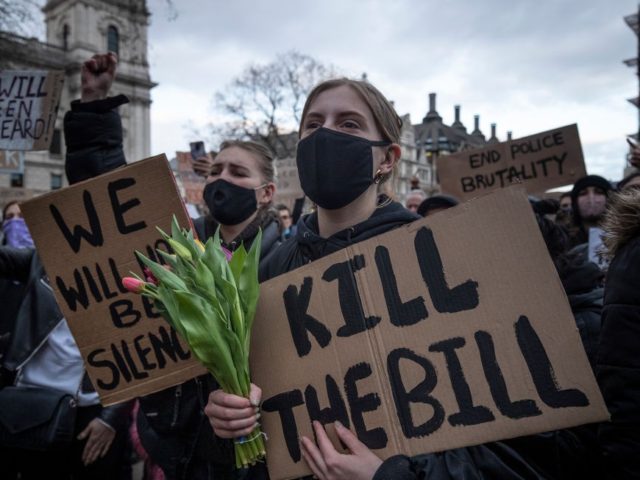Britain will take a step closer to police state tyranny this week when parliament passes a bill that will effectively end the cherished, longstanding tradition of ‘the right to protest.’
The Police, Crime, Sentencing and Courts Bill 2021 has been described by one MP as ‘a major step on the road to authoritarianism and suppression of dissent’ and by a leading criminal barrister as ‘absolutely crazy’ and ‘really scary.’
I wake up this morning full of foreboding for our country.
Today's Policing Bill isn't about the traditional idea of law based on consent.
It's about a major step on the road to authoritarianism and suppression of dissent.— Jon Trickett MP (@jon_trickett) March 15, 2021
Soon you will not be allowed to protest about the removal of your right to protest.
— Chris Daw QC (@crimlawuk) March 15, 2021
The new legislation is the brainchild of Home Secretary Priti Patel and is being sold to the Conservative base as a way of avoiding repeats of the various Black Lives Matter and Extinction Rebellion demos which caused damage to property, massive disruption and a huge bill to the taxpayer for extra policing costs.
There is lots of red meat in it for traditional Conservatives: an eye-catching initiative in which people who damage memorials — like the woke mob which chucked a statue of slave owner Edward Colston into the river in Bristol — could face up to ten years in prison; tougher rules in dealing with travellers who make the lives of rural villagers misery; and so on. This will undoubtedly appeal to the socially conservative Red Wall voters in the Midlands and North, whom Boris Johnson’s government is desperate to keep onboard.
Perhaps this is why so few Conservative MPs are opposing this illiberal measure. Their determination to push the bill through — only the House of Lords can stop it now — is likely to have been strengthened by the thought that most of those most fiercely opposing it are Labour MPs. And if Labour are against, they may well delude themselves, then it must be a jolly good thing.
What few Conservative MPs appear to have realised is that this unprecedented increase in the powers of both the Home Secretary and the police to clamp down on protests of any kind may eventually be used to bite their own supporters, or to suppress freedom generally.
WATCH: London COVID cops clash with Sarah Everard mourners in Clapham at weekend vigil. Read more HERE: https://t.co/hvXfFwxGza pic.twitter.com/uJquVwI4iQ
— Breitbart London (@BreitbartLondon) March 15, 2021
At the moment, sure, attention is being focused on last weekend’s vigil for murder victim Sarah Everard. Heavy-handed policing gave hard left infiltrators just the excuse it needed for a noisy demo in Parliament Square — of the kind that may soon be banned under the new legislation — in which the mob (including Black Lives Matter) chanted angry slogans like ‘kill the bill’.
They can hardly have been unaware, of course, that ‘the Bill’ happens to be a traditional nickname for the police.
But the people most likely to bear the brunt of this new legislation are anti-lockdown protesters. Throughout the last year, these are the people whose protests have been put down most brutally and aggressively by the police. So really, this is legislation that ought to terrify freedom lovers at least as much as the authoritarian, Big State lovers of the far left.
For example, under subsection (1) of section 59 ‘Intentionally or recklessly causing public nuisance’, you now face a jail sentence of up to 10 years if during the course of a protest you cause someone ‘serious annoyance, serious inconvenience or serious loss amenity’.
As leading barrister Chris Daw QC, says, this effectively renders all public protests illegal because, by definition, causing what might be termed ‘serious annoyance’ is the whole point of demonstrations.
When I spoke to Daw this week, he told me:
The whole point of demonstrations is to have an impact. What’s extraordinary about this legislation is that gives the police the power to intervene whether a single individual or a single place of business claims to have been inconvenienced.
It will also, he points out, severely limit the ability of protestors to demonstrate where they most need to be heard.
He says:
It gives the police powers to restrict protests in and around parliament. But the point of demonstrations is to alert those who make the laws to the views of protestors.
Furthermore, the Home Secretary and the police get to decide which protests are ‘so disruptive that they cannot be allowed.’
Daw describes this as ‘really scary.’
Although there has never, strictly speaking, been a ‘Right to Protest’ in the United Kingdom because Britain has no Bill of Rights, it has always been widely understood that people are free to protest in demonstrations whether for women’s suffrage or the right to go foxhunting.
Daw says:
It’s one of the first things you learn when you go to law school: anything not expressly forbidden is permitted. We’ve certainly never had a law go so far as to give the police and the Home Secretary to decide when the right to protest can be infringed. The powers it gives them are so great that effectively well have no right at all to protest.

COMMENTS
Please let us know if you're having issues with commenting.